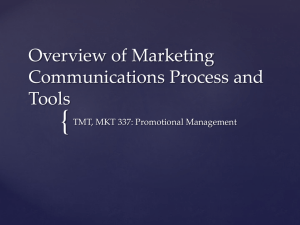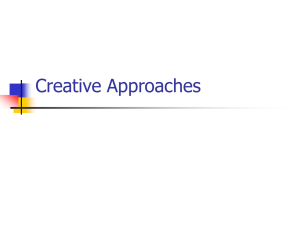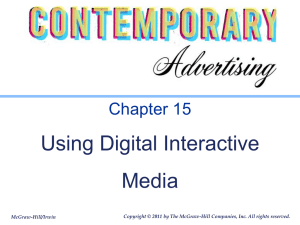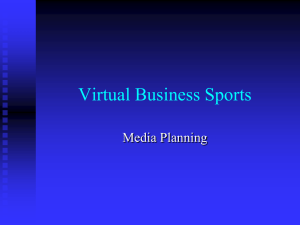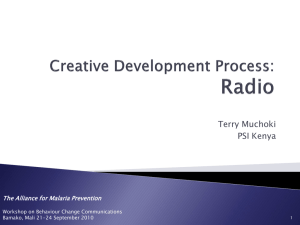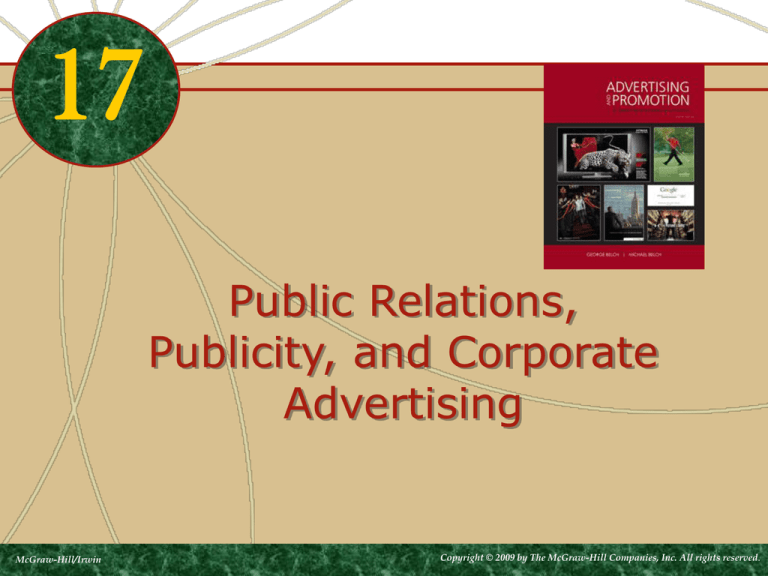
17
Public Relations,
Publicity, and Corporate
Advertising
McGraw-Hill/Irwin
Copyright © 2009 by The McGraw-Hill Companies, Inc. All rights reserved.
Public Relations Defined
A management function
which
and
of
and
to
evaluates public attitudes
identifies the policies and procedures
an organization with the public interest
executes a program of action (and communication)
earn public understanding and acceptance
Public Relations Management Process
Determination and
evaluation of public
attitudes
PR
Identification of policies
and procedures
Development and
execution of the
program
Traditional PR Perspective
Customers
Community
Investors
Public
Relations
Department
Suppliers
Government
Employees
Integration of PR into the Promotional Mix
Separate Functions
Marketing
Department
Public
Relations
Coordinated and Equal
Marketing
Department
Public
Relations
Integrated
Marketing
Department
Public
Relations
Marketing Public Relations Functions
Building market excitement before media ads break
Improving ROI
Creating news where there is no news
Introducing a product with little or no advertising
Providing a value-added customer service
Building brand-to-customer bonds
Influencing influentials, giving info to opinion leaders
Defending products at risk, giving consumers reasons to buy
MPR in Practice
Benefits of MPR
Advantages
A cost-effective way to
reach the market
Breaks though the clutter
Highly targeted way to
conduct public relations
Circumvents resistance to
sales efforts
Endorsements by
independent third parties
Improved media
involvement w/customers
Achievement of credibility
Creates influence among
opinion leaders
Makes advertising
messages more credible
Improved ROI
Benefits of MPR
Disadvantages
Lack of control over media
Difficult to tie in slogans or
other advertising devices
Media time and space aren’t
guaranteed
No standards for effective
measurement
The Process of Public Relations
Determining and Evaluating Public Attitudes
Establishing a PR Plan
Developing and Executing a PR Program
Measuring Program Effectiveness
Test Your Knowledge
In public relations targeting, external audiences
include:
A) Customers
B) The public at large
C) Suppliers
D) Stockholders
E) All of the above
Research on Public Attitudes
Provides input for
the planning process
Serves as an “early
warning system”
Increases
communications
effectiveness
Secures internal
cooperation, support
10 Evaluation Questions
1. Does the plan reflect a thorough
understanding of the company’s business
situation?
2. Has the PR program made good use of
research and background sources?
3. Does the plan include full analysis of
recent editorial coverage?
4. Do the PR people fully understand the
product’s strengths and weaknesses?
5. Does the PR program describe several
cogent, relevant conclusions from the
research?
10 Evaluation Questions
6. Are the program objectives specific and
measurable?
7. Does the program clearly describe what
the PR activity will be and how it will
benefit the company?
8. Does the program describe how its results
will be measured?
9. Do the research, objectives, activities, and
evaluations tie together?
10. Has the PR department communicated
with marketing throughout the
development of the program?
Determining Public Relations Audiences
Internal or
Associated
External or
Independent
Stockholders and
Investors
Educators
Customers and
Clients
Governments
Employees
Financial Groups
Community
Members
Civic and Business
Organizations
Vendors and
Suppliers
The Media
Communicating With Target Audiences
Internal or
Associated
External or
Independent
Newsletters
Public relations ads
Bulletin boards
Press releases
Direct mail
Conferences
Annual reports
Research reports
The Media Also Engages in Public Relations
Implementing the PR Program
Press
Releases
Press
Conferences
Interviews
PR Tools
The
Internet
Exclusives
Community
Involvement
Special Olympics Torch Run
*Click outside of the video screen to advance to the next slide
The Internet as a PR Tool
The Internet…
Allows information to be presented quickly
Provides the media with instant access
to additional sources of information
Allows much more substantial information
to be presented
Advantages of Public Relations
Credibility
Image
Building
Cost
Savings
PR
Provides
Avoidance
of Clutter
Selectivity
Lead
Generation
Potential Problems of Public Relations
Potential for incomplete
communication process
Potential
Problems
Receiver not making
connection to the source
Lack of coordination with
marketing dept.
Inconsistent, redundant
communications
Test Your Knowledge
Which of the following communications is most likely
to have more credibility among its receivers?
A) Vogue's layout introducing its latest models
B) Volvo's television ad promoting new
standard safety features
C) Motor Trend's announcement of the "Car
of the Year"
D) The CEO of Ford Motor Company
appearing in its ads
E) The appearance of the participants in
American Idol in Old Navy ads
General Mills Capitalizes on Publicity
Measuring PR Effectiveness
Contributions made?
What was achieved?
Quantitative measures?
Quality?
Criteria for Measuring PR Effectiveness
Ratio of positive to negative articles
Number of impressions . . .
Over time
On the target audience
On specific target audiences
Percentage of . .
Positive articles over time
Negative articles over time
Percentage of
positive and
negative articles
by . . .
Subject
Publication
Reporter
Target
audience
Additional Measures of PR Effectiveness
Personal observation and reaction
Matching objectives and results
The team approach
Management by objectives
Public opinions and surveys
Audits
Publicity versus Public Relations
Publicity:
The generation of news about a person,
product, or service that appears in the media
A short-term strategy
A subset of public relations
Not always positive
Often originates outside the firm
A Response to Negative Publicity
Pros and Cons of Publicity
Advantages
Disadvantages
Substantial credibility
Timing difficult or
impossible to control
News value
Inaccuracy, omission,
or distortion may
result
Significant word-ofmouth
Perception of
endorsement by
media
Corporate Advertising
An extension of the PR
function
Does not promote a specific
product or service
Promotes the organization
Image
enhancement
Assuming a
position on an
issue or cause
Seeks
involvement
Why is Corporate Advertising Controversial?
Consumers aren’t
interested in this form of
advertising
Claims of
Opponents to
Corporate
Advertising
Corporate advertising is
a waste of money
The firm’s finances or
image must be in trouble
This is a costly form of
corporate self-indulgence
Objectives of Corporate Advertising
Establish
diversified
company
identity
Create a positive
image for the
firm
Communicate
the
organization’s
viewpoint
Objectives
Help newly
deregulated
industries
Boost
employee
morale
Smooth labor
relations
Types of Corporate Advertising
Image
Advertising
General Image Ads
Positioning Ads
Event
Sponsorship
Sponsorship
Recruitment
Advocacy
Advertising
Cause-related
Advertising
Financial Support
Boeing Advertises to Enhance Its Image
*Click outside of the video screen to advance to the next slide
Employee Recruitment by Grant Thornton
Event Sponsorship
Corporate Sponsor
Sporting
Events
Music,
Entertainment
Causes
Festivals
Cultural Events
Arts
Test Your Knowledge
Why would World Wrestling Entertainment (WWE)
sponsor a car on the NASCAR racing circuit?
A) To build equity and gain affinity with its
target market
B) To show its position on sports marketing
C) To create a generic positioning strategy
D) To further segment its target market
E) To reduce its overall promotional expenses
Advocacy Advertising
Advocacy advertising:
The propagation of ideas and
elucidation of controversial social
issues of public importance in a
manner that supports the interests
of the sponsor.
American Gas Association Advocacy Ad
Cause Related Marketing
Cause related marketing:
A form of marketing whereby
companies link with charities or
nonprofit organizations as
contributing sponsors.
Pros and Cons of Corporate Advertising
Advantages
Disadvantages
Excellent vehicle for
positioning the firm
May have
questionable
effectiveness
Takes advantage of
benefits derived from
public relations
Raises questions of
constitutionality and
ethics
Reaches a selected
target market
Measuring Corporate Ad Effectiveness
Attitude Surveys
Effective?
Relating to Stock Prices
Focus Group Research

